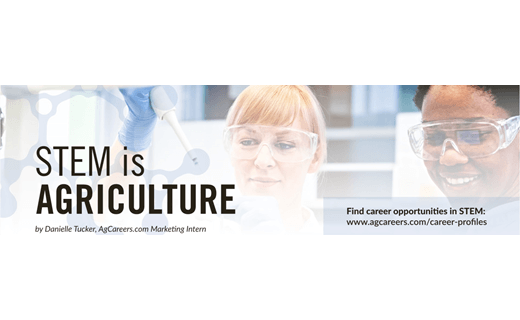- Candidates
- Login
- Set Up Account
- Create a Job Alert
- Search Tools
- Resources
- Employers

By Danielle Tucker, AgCareers.com
You probably haven’t seen anyone out handpicking corn with a husking knife or a peg strapped to the palm of their hands. Why not? Because science, technology, engineering, and mathematics have helped change agriculture. These fields are known as STEM careers, and we are in desperate need of them.
Farmers cannot feed the world alone. If we solely rely on the diminishing number of farmers to meet our food needs, there simply won’t be enough. However, you have the opportunity to make a difference in the world through the pursuit of a career in STEM.
ADVANCING AGRICULTURE
Matching the demand for food means increased efforts to improve efficiency, yields, equipment design, genetics and more. Following is a list of a few examples of the efforts from STEM careers that will help us feed the increasing population.
Technology: Internet of things (IoT), Artificial Intelligence (AI), and Big Data are entering agriculture with a promising solution to meet food demands. These devices could stretch beyond the limits of what large-scale machinery could ever reach. Smart farming is becoming more common, with drones and sensors leading the way to better results.
Genetics: Scientists are improving genetics of both plants and animals which has allowed producers to improve the traits of each following generation of offspring. Desired traits allow high-performance crops and animals.
Byproducts: Sustainable solutions that better serve the environment and our future are being discovered and put to work in agriculture. Utilization of byproducts can allow farmers to maximize the use of their resources. Research is currently being conducted to better understand what byproducts could mean for the future and how they can deliver a better product for our environment.
Vertical Farming: There’s only so much land to go around and vertical farming is a potential solution to result in higher production power per square meter. Whether this can or can’t produce a viable system for farming, what’s important is that urban areas are getting involved with agriculture.

OPPORTUNITIES IN STEM
There are hundreds of degree types in STEM and most of them relate to agriculture in more ways than you may realize. You can match these degrees to hundreds of job opportunities that exist within agriculture. Students pursuing degrees in STEM are carving new tools to find solutions to feeding the drastically rising demand for food.
It’s easy to match your passions to careers in STEM and agriculture. With science being the very nature of agriculture, major companies are constantly hiring chemists, biologists, geneticists, entomologists, breeders, agronomists, pathologists, and veterinarians to consistently advance plant and animal science. Beyond these realms, you may also find careers in food science and environmental science that are equally vital to agriculture. ‘
If you are interested in technology, opportunities exist within not only information technology but also precision agriculture, food technology, GPS and drone technology, and automation technology. Technology often crosses paths with engineering, the third field within STEM. Engineering careers are present in agricultural mechanics, environmental science, and food science.
Have a love for numbers and computing? Mathematical careers range from engineering to finance and from economics to logistics. Formulations, bioinformatics, and biostatistics overlap mathematics and science, as many other STEM careers also do.
There’s much more to farming than driving tractors and milking cows, and there’s much more to agriculture than business. We need farmers and we need drivers of change, but what we desperately need are solutions to the challenges and threats the industry faces. There are countless STEM careers available to you at this very moment with the possibility to change the world.
Find career opportunities in STEM:
www.agcareers.com/career-profiles